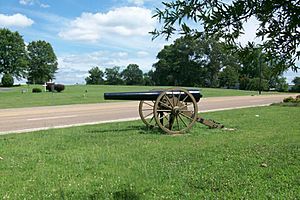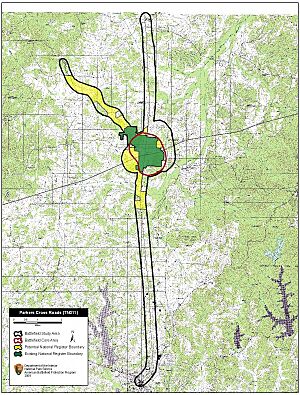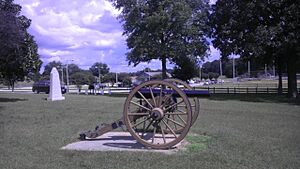Battle of Parker's Cross Roads facts for kids
Quick facts for kids Battle of Parker's Cross Roads |
|||||||
|---|---|---|---|---|---|---|---|
| Part of American Civil War | |||||||
 A replica cannon on the site of the battle. |
|||||||
|
|||||||
| Belligerents | |||||||
| Commanders and leaders | |||||||
| Jeremiah C. Sullivan | Nathan Bedford Forrest | ||||||
| Units involved | |||||||
| 50th Indiana Infantry Regiment 122nd Illinois Infantry Regiment 18th Illinois Mounted Infantry Regiment 39th Iowa Infantry Regiment 7th Wisconsin Artillery Battery 27th Ohio Infantry Regiment 39th Ohio Infantry Regiment 63rd Ohio Infantry Regiment |
8th Tennessee Cavalry 4th Alabama Cavalry 19th Tennessee Cavalry Napier's Cavalry Battalion Kentucky Battalion 4th Tennessee Cavalry 2nd Battalion Tennessee Cavalry Freeman's Battery Morton's Battery |
||||||
| Strength | |||||||
| 3,000 | 1,800 | ||||||
| Casualties and losses | |||||||
| 237 | 500 | ||||||
The Battle of Parker's Cross Roads was an important fight during the American Civil War. It took place on December 31, 1862, in Henderson County, Tennessee. This battle was part of a larger plan by Confederate forces to disrupt Union supply lines.
Why the Battle Happened
As Confederate General Nathan Bedford Forrest was finishing his journey through West Tennessee, Union forces tried to stop him. Union General Jeremiah C. Sullivan wanted to cut off Forrest's path. He hoped to prevent Forrest from crossing back over the Tennessee River.
The Battle Unfolds
General Dunham's Union troops and General Forrest's Confederate troops met at Parker's Crossroads. This happened on December 31, 1862. Small fights, called skirmishes, started around 9:00 in the morning. Forrest's soldiers first took a position on a wooded hill. This hill was northwest of Dunham's location at the crossroads.
Confederate cannons, called artillery, quickly gained an advantage. General Dunham moved his soldiers back about half a mile. He then set them up again, facing north. His Union soldiers fought off attacks from the front. But then, Forrest's soldiers, both on horses and on foot, attacked from both sides and from behind.
During a quiet moment in the fighting, Forrest demanded that Dunham surrender. Dunham refused. He was getting ready for Forrest's next attack. Suddenly, another Union group, led by General John W. Fuller, arrived from the north. They surprised the Confederates by attacking them from behind. Forrest's guards had not warned him that Fuller was coming.
Forrest famously shouted, "Charge 'em both ways!" The Confederates quickly turned around to face Fuller. They pushed Fuller's group back. Then, they rushed past Dunham's tired soldiers. Forrest's troops then pulled back and headed south towards Lexington, Tennessee.
What Happened After
After the battle, General Forrest successfully crossed the Tennessee River. Both sides said they won the battle. However, the Confederates' claim seems more accurate.
Saving the Battlefield
Today, the land where the Battle of Parker's Cross Roads took place is very busy. Interstate 40 runs east and west through it. Tennessee State Route 22 runs north and south. The area is located between Memphis and Nashville. The nearby town has grown a lot since the interstate opened in the 1960s.
Builders and investors often look at the battlefield area for new businesses. This makes it very important to save the land. So far, 368 acres of the battlefield have been protected. This was done by the American Battlefield Trust and its partners. One of these partners is a local group called The Parker's Crossroads Battlefield Association.
In 2011, the Trust started a project to save a special piece of land. It is called the "keystone tract." This 52-acre area is the last part of the old battlefield that is not protected. Most of the Confederate cannons were located on this land. Many people who work to save historical sites believe that if this land is built on, it will be hard to understand the battle's history in a meaningful way.
 | Jewel Prestage |
 | Ella Baker |
 | Fannie Lou Hamer |



